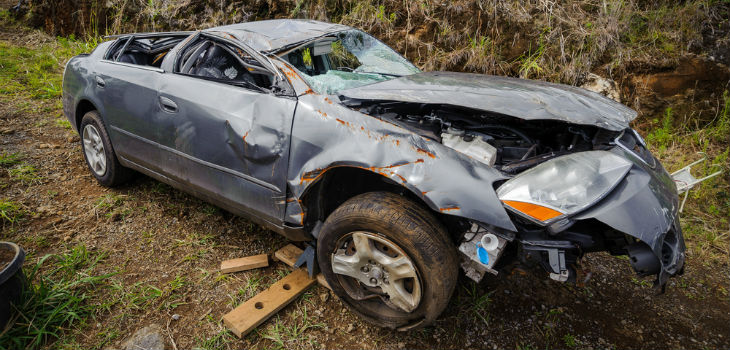:max_bytes(150000):strip_icc()/GettyImages-1191718909-3fff9dcf7d704fb39bcd683c7147fe95.jpg)
Who Gets Paid if a Leased Car Is Totaled?
Imagine this: You’re driving your leased car, minding your own business, when suddenly, disaster strikes. Another vehicle runs a red light and smashes into you, totaling your car. Now you’re left wondering, “Who gets paid if my leased car is totaled?” Don’t worry; we’ll break down the legalities and insurance aspects to help you navigate this complex situation.
In most cases, when a leased car is totaled, the insurance company will pay off the remaining balance on the lease to the leasing company. You, as the lessee, will not receive any money from the insurance company, but you will be released from your lease obligation. This arrangement ensures that the leasing company, the entity that owns the car, is compensated for the loss of their property.
Understanding Gap Insurance
However, there may be instances where the insurance payout is less than the remaining balance on the lease. In such cases, you could end up owing money to the leasing company. To avoid this scenario, consider purchasing Gap insurance, an optional coverage that pays the difference between the insurance payout and the remaining lease balance.
Gap insurance acts as a safety net, providing financial protection for you in the event of a totaled leased car. It’s particularly beneficial if you made a small down payment on the lease or if the car has depreciated significantly.
Insurance Coverage and Responsibilities
In addition to gap insurance, it’s crucial to understand the different types of insurance coverage available and their respective responsibilities. When you lease a car, the leasing company typically requires you to carry comprehensive and collision insurance. Comprehensive insurance covers damage caused by events other than collisions, such as theft, vandalism, or natural disasters. Collision insurance covers damage caused by collisions with other vehicles or objects.
If you are at fault for the accident that totaled your leased car, your collision insurance will cover the damages and pay off the remaining lease balance to the leasing company. If the other driver is at fault, their insurance company will be responsible for the damages and any payments to the leasing company.
Understanding Your Lease Agreement
Before you sign a lease agreement, it’s essential to carefully review the terms and conditions related to totaled vehicles. The agreement should outline the leasing company’s policies regarding total loss and any additional responsibilities you may have. By thoroughly understanding the lease agreement, you can avoid any surprises or disputes in the event of an accident.
It’s also a good idea to read your insurance policy thoroughly to ensure you understand the coverage limits and exclusions. If you have any questions or concerns, don’t hesitate to contact your insurance agent for clarification.
Tips and Expert Advice for Leased Cars
To mitigate the financial impact of a totaled leased car, consider the following tips and expert advice:
- Purchase gap insurance. This coverage can provide peace of mind and prevent you from owing money to the leasing company.
- Maintain good driving habits. By driving safely and avoiding accidents, you reduce the risk of totaling your car and facing financial consequences.
- Keep up with lease payments. If you fall behind on your payments, the leasing company may repossess your car, leaving you in an even more challenging financial situation.
- Document your mileage. If you exceed the mileage limits outlined in your lease agreement, you may incur additional charges from the leasing company.
- Return the car in good condition. When your lease ends, the leasing company will inspect the car for any damages or excessive wear and tear. Returning the car in good condition can help you avoid additional charges.
Following these tips and consulting with an insurance expert can help you navigate the complexities of leasing a car and minimize financial risks in the event of an accident.
FAQs on Totaled Leased Cars
1. Who gets paid if a leased car is totaled?
In most cases, the insurance company will pay the leasing company the remaining balance on the lease, and the lessee will be released from their lease obligation.
2. What is gap insurance?
Gap insurance covers the difference between the insurance payout and the remaining balance on the lease, protecting the lessee from owing money to the leasing company if the car is totaled.
3. Is gap insurance required?
Gap insurance is not required by law, but it’s highly recommended for lessees who make a small down payment or lease a car that depreciates quickly.
4. What happens if I’m at fault for totaling my leased car?
If you are at fault, your collision insurance will cover the damages and pay off the remaining lease balance to the leasing company.
5. What should I do if my leased car is totaled?
Contact your insurance company immediately to report the accident and file a claim. The insurance company will guide you through the process and determine the best course of action based on your specific situation.
Conclusion
Understanding the financial implications of a totaled leased car can help you make informed decisions and protect yourself from unexpected expenses. By purchasing gap insurance, maintaining good driving habits, and carefully reviewing your lease agreement, you can mitigate the risks associated with leasing a car. Remember to consult with an insurance expert to ensure you have the appropriate coverage for your needs. Are you interested in learning more about this topic?

Image: www.thefinancialword.com

Image: freedomgeneral.com
What happens if you total a leased car? Mar 18, 2024Summary: If you total a leased car, your insurance company will typically cover the vehicle’s actual cash value (ACV). In cases where the ACV of the car is the same as the outstanding balance, you simply terminate the lease agreement and walk away. The problem is that in most cases, you will still owe something to the leasing company.